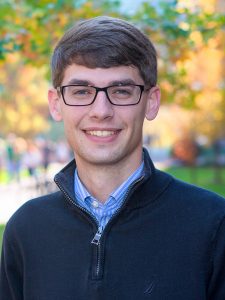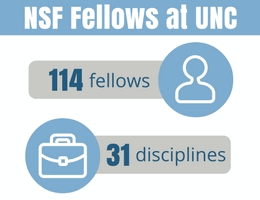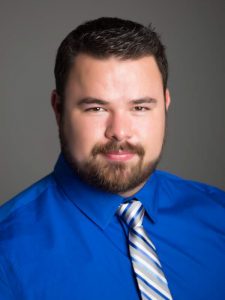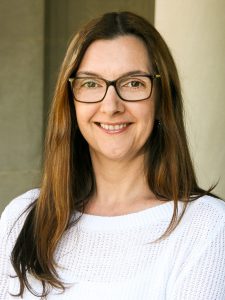National Science Foundation Fellowships catalyze future leaders and researchers

Doctoral student Tyler Farnsworth is passionate about science communication, particularly how it bridges the gap between science and non-science audiences. He is currently helping to develop an interdisciplinary workshop designed to help graduate students effectively communicate with members of Congress on issues related to research funding.
Farnsworth, whose academic program is chemistry, is a National Science Foundation Graduate Research Fellowship recipient. He credits his NSF fellowship for providing the freedom to pursue his research interests and implement innovative ideas about communication.
Farnsworth and a number of University of North Carolina at Chapel Hill graduate students are developing leadership skills that will shape the future of science and research through their NSF fellowships.
Top graduate students nationwide receive NSF Graduate Research Fellowships to support their training as the future researchers of our country. The fellowship is open to students in any field supported by the NSF, including disciplines as diverse as physics, anthropology, sociology and political science.
The highly competitive three-year fellowship includes full tuition, health insurance and a $34,000 yearly stipend – the largest award at UNC-Chapel Hill. There are currently 114 UNC-Chapel Hill NSF fellows in 31 different disciplines.

The Graduate School is working closely with the NSF fellows to provide professional development programming that includes topics such as grant-writing, presentation skills and interdisciplinary communication, among other areas.
“The aim is to prepare fellows for successful STEM careers, both inside and outside of academia,” said Sandra Hoeflich, The Graduate School’s associate dean for interdisciplinary education, fellowships and communication.
With support from The Graduate School, Farnsworth also started a multi-department interdisciplinary peer review program three years ago to connect current and applying NSF fellows. This year’s third annual review session had around 30 participants from more than 10 different departments.

Adam Hoffman, a doctoral student in psychology, said the professional development will help to shape future researchers in a more holistic way. He said it offers NSF fellows a chance to develop skills beyond doing and publishing research to create a more well-rounded scientist and individual.
“The fellowship really gave me the confidence I needed to pursue my ideas and the research that follows,” Hoffman added. “It’s a validation of yourself as a scientist, that someone believed that you produced a great idea and can do great science.”
Hoffman studies the relationship between gender and ethnic and racial identities and academic motivation and achievement. His goal is to translate his research into a way to bolster academic motivation and help people be more successful – in many domains, but particularly in academic settings – despite any barriers they may face.

Cassandra Hayne is a biochemistry and biophysics doctoral student studying human enzymes and proteins that maintain balanced levels of fat in the blood. She, along with Hoffman, participated in the NSF’s Graduate Research Opportunities Worldwide (GROW) program.
The GROW program supported a collaboration between Hayne and an expert in Ireland who specializes in solving structures of proteins. According to Hayne, the collaboration has helped to greatly advance her own research, skill set, network and broader scientific knowledge.
“We were hitting roadblocks [in research] that required equipment not widely available,” Hayne said. “When I had the opportunity to meet my GROW host, I knew it was a chance to really make my project go big.”
The NSF award also frees up the time of graduate students to strengthen the rigor of their research and take a deeper dive into things such as methodological issues. Dalila Dragnic-Cindric is appreciative of the opportunity to explore areas of research that seem particularly salient to her work, and to also have the time to attend NSF workshops and events.
Dragnic-Cindric is an NSF fellow in education. Her work is focused on the meaningful and effective use of technology to support STEM teachers and students in under-resourced areas and schools. She considers the NSF fellowship a great honor.

“I am humbled by the fact that I get to engage with some of the nation’s finest minds in the field of educational research on daily basis,” Dragnic-Cindric said, describing the synergy between NSF fellows as they share knowledge and experience across disciplines. “To be able to learn from them – both faculty members as well as my peers – is a mind-boggling privilege.”
In 2016, The Graduate School applied for and was awarded additional NSF grant funding to enhance professional skills training for NSF fellows. Hoeflich is the grant’s principal investigator, and planning is under way for an intensive leadership-focused program.
Professional development is necessary for all graduate students, and it is an essential component of The Graduate School’s mission, Hoeflich said.
“The National Science Foundation and other partners help us put responsive professional training in motion. The students who pursue these opportunities go on to work in labs, government, industry or the private sector – and they will be trained to be leaders, no matter which career paths they choose.”
Save
